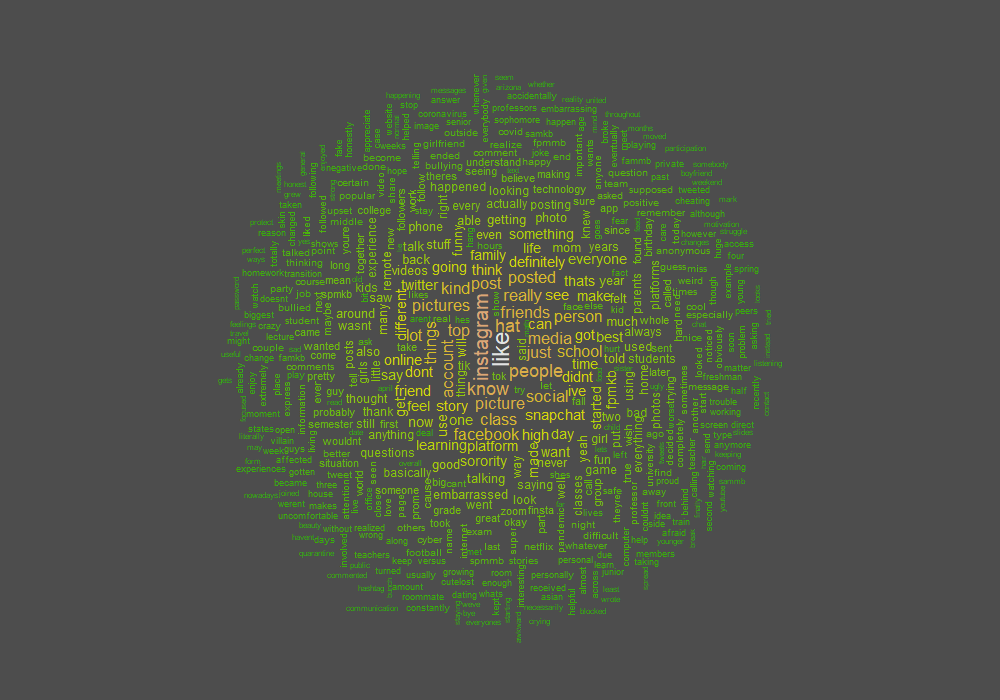
From student voices to knowledge discovery.
The word cloud above was created based on a corpus of deidentified transcripts from student media stories submitted to the Social Media & Ourselves podcast. Interns in the School of Information Master of Library and Information Science program have worked with Dr. Hong Cui to develop and refine a taxonomy based on this growing corpus since the spring of 2021.
Wordcloud.R was used to generate the word.frequency.cvs, word.ti.idf.cvs, and the word clouds pgn files: wordcloud.tf.idf.0.4.pgn.
Wordcloud.tf.idf.0.4.pgn: : generated using tf.idf scores, with the threshold = 0.4 (it. Words that scored 0.4 and aboved are included in the cloud)
Research questions pursued by iVoices and our timeline
iVoices is a three year project funded in part by the Center for University Education and Scholarship, through a generous fellowship to Dr. Diana Daly. In research in 2022 and 2023, Dr. Daly and iVoices aim to address the following research questions:
- How do undergraduate students' experiences with technologies shape their engagement in learning?
- In what ways do students’ narratives around technologies enrich new media scholarship?
1b: How does collaborative annotation including sharing of student stories manifest as knowledge construction? - How do we best integrate student knowledge around technologies into new media curricula?
- What are the impacts of training students in media production and leadership on students and their communities?
- What are best practices for a media lab around student perspectives on social and educational technologies?
Research Presentations and Papers
Coding Funds of Knowledge in the iVoices Media Lab: Student Stories About Technologies (Runner Up, Best Paper Award, iConference 2023)
Abstract: This paper reports on an in-progress study analyzing youth technol-
ogy experiences through a collection of stories created and openly licensed by
students. We analyzed the transcripts of student-created animated video stories
for a student media lab-based project in a social media studies course in spring
2021. Open coding of 44 transcripts found that students reflect on their past social
media experiences through key thematic heuristics, such as contexts of adop-
tion including grade level, mood, and influence; and dimensions of growing self-
awareness around use including influences of others, changes in popular platforms
like Instagram, and changes from playful to curated self-presentation. We present
early analysis of code co-occurrences including emotion and influence, grade level
and influence, and emotional weight specifically around Instagram. We end with
plans for further research on this and related datasets, including audiovisual data
and analysis through the lens of media literacy, and implications for researchers
and instructors in information, new media, and education.
Keywords: Digital storytelling · Higher education · Social media · Instagram ·
Media production
Diana Daly, Anna R. Leach in Information for a Better World: Normality,… (2023)
What Do We Do with the Fruits of Open Educational Practices? A Case for Open Educational Collections
In this article perspectives are offered by an instructor, author, and researcher involved in the open textbook Humans R Social Media and resulting OEC (Open Educational Collection) developed at a large southwest...
Diana Daly in Information for a Better World: Normality,… (2023)
#backtothekitchen and the Incessancy of Normalized Misogyny Online
Abstract: This research arose from the iVoices project collection of student technology experiences guiding research. In response to students being told to “go back to the kitchen” while gaming and reading as “female”, our team analyzed TikTok for videos hashtagged #gobacktothekitchen and #backtothekitchen across a one-year period. We also performed deeper analysis on comeback appeals eliciting or offering suggestions of responses to “Go back to the kitchen” and related misogyny and their responses. We found videos were typically created by “girl gamers” toward whom “back to the kitchen” misogyny had been directed, and who tagged them to assign networked meanings to their experiences, encapsulate their struggles for broad publics, and find validation with users sharing similar experiences. A salient theme in comeback appeal posts was performing positions of power to gain leverage over aggressors, while comments frequently offered support from other “girl gamers” and reinforcement of misogynistic stereotypes by male-identified aggressors.
FEB 2022: iVoices: Channeling Student Technology Experiences into New Media, Curricula, and Scholarship,
CUES Inside UA-Funded Scholarship Series, University of Arizona, Tucson, AZ (Virtual)
View this Google Slides Presentation presented at the Hawaii University International Conference, January 5th 2022.
OCT 2021: Improving Learning Outcomes through Open Pedagogy.
Workshop presented at The 2021 Open Education Conference.
Virtual, with Cheryl (Cuillier) Casey, Open Education Librarian, University of Arizona
Video with transcription here
View this Google Slides Presentation presented at the Hawaii University International Conference, January 5th 2022.
OCT 2021: Open pedagogy: Independence and interdependence in teaching about new media (LINKED PAPER). Paper presented at AoIR 2021: The 22nd Annual Conference of the Association of Internet Researchers. Virtual, with Cheryl (Cuillier) Casey, Open Education Librarian, University of Arizona
